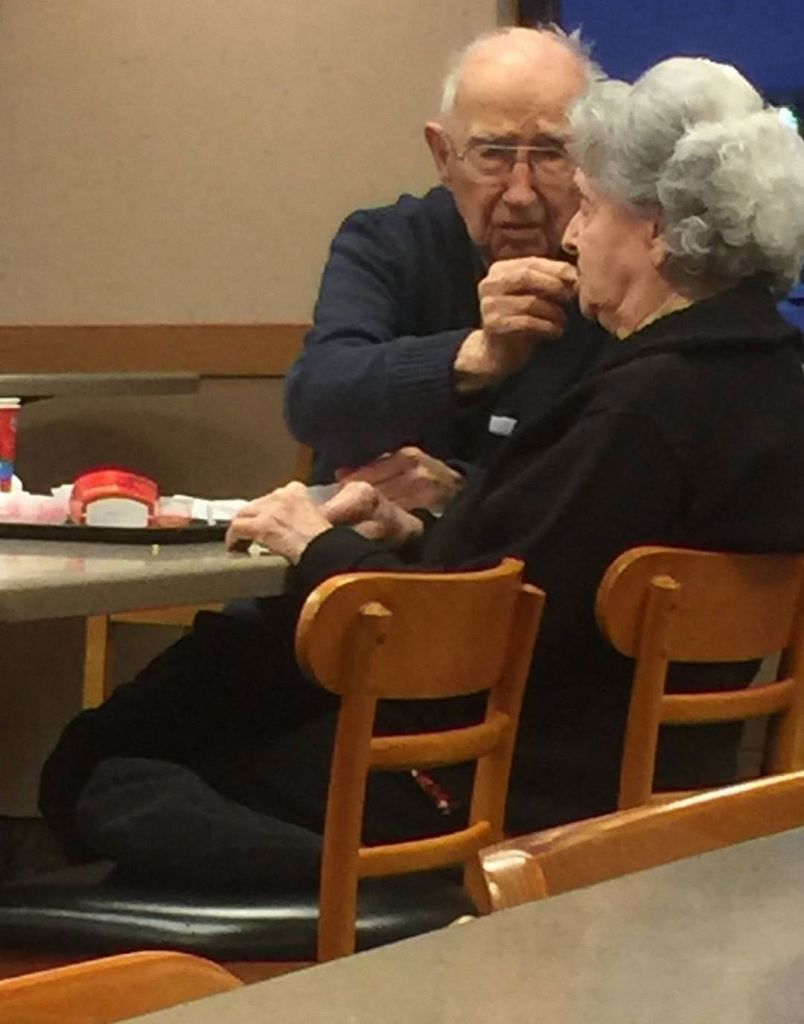The lunchtime rush at a fast-food restaurant has a rhythm all its own. It’s a backdrop of sizzling grills, beeping fryers, and the low murmur of conversations from a dozen different tables. I was just another part of that scene, sitting alone in a Wendy’s booth with a double cheeseburger, seeking a few moments of quiet in the middle of a busy day. As I ate, my gaze drifted across the room and settled on an elderly couple sharing a meal. They were likely in their late seventies or early eighties, and there was a comfortable silence between them that spoke of decades spent together.
What caught my attention, however, was the husband’s actions. While his own food sat untouched, he had taken his wife’s hamburger and was methodically cutting it into small, almost minuscule pieces with a plastic knife. He performed the task with the focused precision of a surgeon, his hands steady and his movements filled with an undeniable tenderness. He carefully separated the bun from the patty, diced the meat into neat squares, and then reassembled each tiny portion for her. She watched him, her hands resting in her lap, with a look of peaceful patience.
My heart immediately went out to them, and my mind constructed a narrative of hardship. “How tragic,” I thought to myself. “She must be very ill, perhaps unable to chew her own food.” I imagined she had no teeth, or was recovering from a stroke, or was suffering from some other ailment that had robbed her of the simple ability to enjoy a meal. I saw a story of caregiving in the face of decline, a husband’s solemn duty to his fading wife. The scene was both beautiful in its dedication and deeply saddening in its implication. I felt a profound sense of admiration for the man’s unwavering service, mixed with a poignant sorrow for the circumstances I assumed they were enduring.
The longer I watched, the more I was moved by the quiet dignity of their interaction. This was not a chore for him; it was a ritual. He did not seem burdened; he seemed devoted. After a few more minutes of observation, I couldn’t sit by any longer. I felt an overwhelming urge to acknowledge his act of love.

Leaving my own meal half-eaten, I walked over to their table. “Excuse me,” I said softly, not wanting to intrude too much. “I couldn’t help but notice what you’re doing for your wife. I think it’s a wonderful and loving thing.”
The man looked up at me, his eyes crinkling into a warm smile. “Thank you,” he said graciously.
I hesitated for a moment, then decided to gently ask the question that was at the heart of my concern. “I hope you don’t mind me asking, but is your wife unable to chew? Is that why you do this for her?”
His smile broadened. He let out a soft chuckle and reached over to pat his wife’s hand. “Oh no, not at all,” he said, his voice filled with affection. “She has all her teeth. She’s perfectly fine.”
I was momentarily confused. “Oh,” I said. “Then why…?”
The man looked at his wife with a gaze so full of love it seemed to fill the entire restaurant. “Because she likes to relish her food,” he explained simply. “She enjoys savoring every single bite. I’ve been doing this for her for years. It makes her happy, and I love to watch her enjoy it.”
The truth was so much more beautiful than the sad story I had invented. This was not an act of necessity born from illness. This was a deliberate act of love, a choice made day after day, year after year, simply to heighten his wife’s joy. He sacrificed his own mealtime to curate hers, not because she couldn’t do it herself, but because he delighted in her delight.
I was humbled and speechless. I had looked at them and seen pity, but I was witnessing pure, unadulterated devotion. I mumbled my thanks for sharing that with me and returned to my table, my own burger suddenly forgotten. I watched as his wife picked up one of the tiny pieces with a fork and ate it with a look of true contentment. I hadn’t seen a tragedy. I had seen a love story.